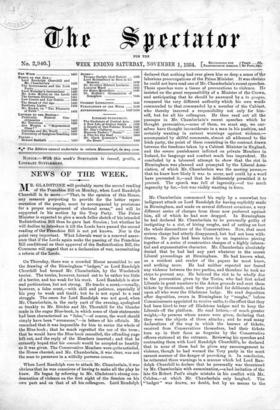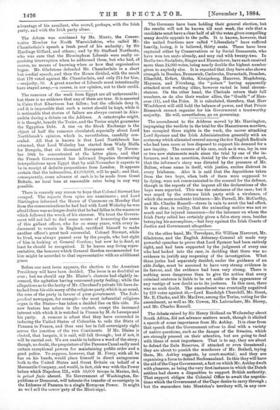Mr. Chamberlain commenced his reply by a somewhat too indignant
attack on Lord Randolph for having explicitly made in Birmingham, and made on several different occasions, a very different series of charges from those now preferred against him, all of which he had now dropped. In Birmingham he had declared Mr. Chamberlain to be personally guilty of instigating to a riot, of hiring roughs, and of setting on foot the whole discomfiture of the Conservatives. Now, that most serious charge had utterly disappeared, but had not been with- drawn. Its place had been taken by an ingenious piecing together of a series of constructive charges of a highly inferen- tial and argumentative character. Mr. Chamberlain absolutely denied that he had had any part whatever in the recent Liberal proceedings at Birmingham. He had known what, as a resident and reader of the papers he must know, and nothing more. He had neither expected nor feared any violence between the two parties, and therefore he took no steps to prevent any. He believed the riot to be wholly due to the provocation given by the Tories, who had first asked Liberals in great numbers to the Aston grounds and sent them tickets by thonsandS, and then provided for deliberate attacks upon all who wore the Gladstone badge. He read deposition after deposition, sworn in Birmingham by "roughs," before Commissioners appointed to receive oaths, to the effect that they had been hired to tear off Gladstone badges and to keep the Liberals off the platform. He read letters,—of much greater weight,—by persons whose names were given, declaring that, they were the objects of these attacks ; and he read many declarations of the way in which the bearers of tickets, received from Conservatives themselves, had their tickets torn up in their faces as forgeries by the Conservative officers stationed at the entrance. Reviewing his speeches and contrasting them with Lord Randolph Churchill's, he declared that in none of them had he given any encouragement to violence, though he had warned the Tory party in the most earnest manner of the danger of provoking it. In conclusion, he reiterated these warnings in a manner which led Lord Ran- dolph Churchill to declare that he personally was threatened by Mr. Chamberlain with assassination,—a bad imitation of the late Sir Robert Peel's single mistake in his conflict with Mr. Cobden,—at which Mr. Chamberlain only laughed. The " badger " was drawn, no doubt, but by no means to the
advantage of his assailant, who scored, perhaps, with the Irish party, and with the Irish party alone.















































